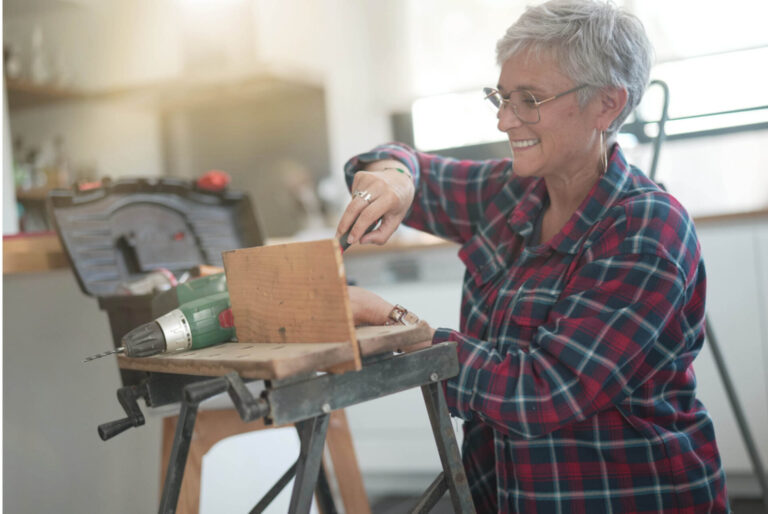For many people, getting older means retiring and spending more time at home. Maybe you take up gardening, or maybe you start reading a couple more books. No matter what you’d like to spend your retirement years doing, the ever-present task of home maintenance will still be front and centre.
Home maintenance is a necessary chore for many Aussie seniors, but for some it can actually provide plenty of opportunities for rewarding work. After all, the time and energy you invest in maintaining your home can provide plenty of pride for independent seniors.
But you can’t do everything yourself. To help provide some extra guidance, we’ll be sharing our top tips and tricks for independent seniors who are looking to stay on top of their home repairs and maintenance task lists.
Identify which jobs you can’t take on yourself
First and foremost, you’ll need to make a list of the maintenance tasks that you’ll absolutely need to outsource. This includes any specialist works like electrical, plumbing, guttering, and renovation or carpentry. All of these home maintenance tasks are best handled by the pros, so prepare your own household list of tradespeople for handling any tasks that pertain to these trades categories.
You’ll also want to make sure you’re hiring local tradies to handle jobs that may be affected by local weather conditions. For instance, you can rely on a Melbourne electrician to set up a fuse box in a method that can withstand blustery Melbourne winter storms. Similarly, if you’re looking to install an air conditioner in Brisbane, then you’ll want a HVAC specialist that’s well acquainted with the city’s signature humidity.
These jobs aside, you should feel confident to handle other more basic home maintenance tasks independently. With a little DIY knowhow, you can grease those squeaky door hinges, replace broken handles, repair your flyscreens, and a whole lot more.
Outline your basic home maintenance
 Speaking of your basic home maintenance tasks, it’s imperative that you put together a thorough breakdown of all the tasks that will need to be completed around your home on a routine basis. This includes seasonal jobs like cleaning out your rain gutters, as well as weekly and monthly jobs.
Speaking of your basic home maintenance tasks, it’s imperative that you put together a thorough breakdown of all the tasks that will need to be completed around your home on a routine basis. This includes seasonal jobs like cleaning out your rain gutters, as well as weekly and monthly jobs.
Some of the main basic home maintenance jobs that you should plan to do routinely include:
- Sweeping, vacuuming, and mopping
- Cleaning vacuum and air conditioner filters
- Clearing kitchen counters and fixtures
- Cleaning toilets, showers, and bathroom spaces
- Cleaning exhaust fans and ventilation
- Gardening and tree trimming
- Treating timber decking
As for basic home repair jobs, homeowners can expect to conduct minor repairs like sealing cracks in walls, repainting interior or exterior walls, treating timber floorboards, and repairing fences. These basic repair jobs should be easy enough to handle on your own, but don’t hesitate to secure assistance with friends and loved ones or even trusted handymen if you feel that you would benefit from the additional support.
Major home maintenance tasks you shouldn’t forget
Whether you’re living in an older property or a newer build, there are some home maintenance appointments that are best kept punctual. This includes appointments like termite inspections, electrical safety checks, and plumbing checks. Keeping all of these major home maintenance tasks in accordance with maintenance calendars (provided by your service providers) will no doubt bring great peace of mind that your home stays a solid investment.
Let’s start with termite inspections first. Depending on your area, termite (or ‘white ant’) infections may be common or quite rare, but if your house hasn’t had a check within the last five years, it may be time to call someone in. The great news about this treatment is that once you’ve scheduled it once, you likely won’t need follow-up inspections or additional treatments until years down the line. Even so, it’s still worth checking for the tell-tale signs of termite infestations periodically to make sure that your house stays safe from these destructive creepy crawlies.
But there are more things that cause expensive structural damage around your home than just termites alone. For instance, things like moisture and even salt can cripple brickwork and greatly undermine the structural integrity of your home from the ground up. So make sure that you have a plumbing safety inspection conducted on your home regularly. Yes, you can buy moisture meters yourself, but if there’s a genuine concern that needs to be addressed, then it’s best to not waste any time.
Finally, if you’re looking to have any assistive technology installed in your home, this is also best handled by experienced electricians rather than taken on as a DIY project.
What basic tools do you need to keep your home in good condition?
Repairing your whole house sounds like it’d take a garage-full of tools, but it’s usually closer to a toolbox-full. An electric drill is a must have, and an electric saw for tree branches is a treat, but most other tools can be manual. Here’s’ what you need to start fixing up your house:
- Paint brushes, paint rollers, roller tray, and a litre or two of paint (i.e. the same paint colour used for your interior walls)
- Overalls, boots, gloves, and other work attire
- A hammer and nails (for installing nails or hooks in walls)
- Screwdriver sets, drills, allen keys (for assembling furniture and other general craft/repair jobs)
- WD40 solvent and lithium grease
- Tarps and paper towels (for mess control)
- Duct tape, masking tape, and electrical tape
- Wall putty, sandpaper, and filler blades for application
Conclusion
Once you’ve taken your first step towards being your own handyman, you’ll realise how manageable it is – and even how enjoyable it is. Start small with some crack repair or spot painting, then work your way up and you’ll be retiling your bathroom in no time. Just remember to take care when handling a hammer, and be mindful of the noise you make. Just because you’re a senior, it doesn’t mean the neighbours won’t still make a noise complaint over your passionate hammering!




